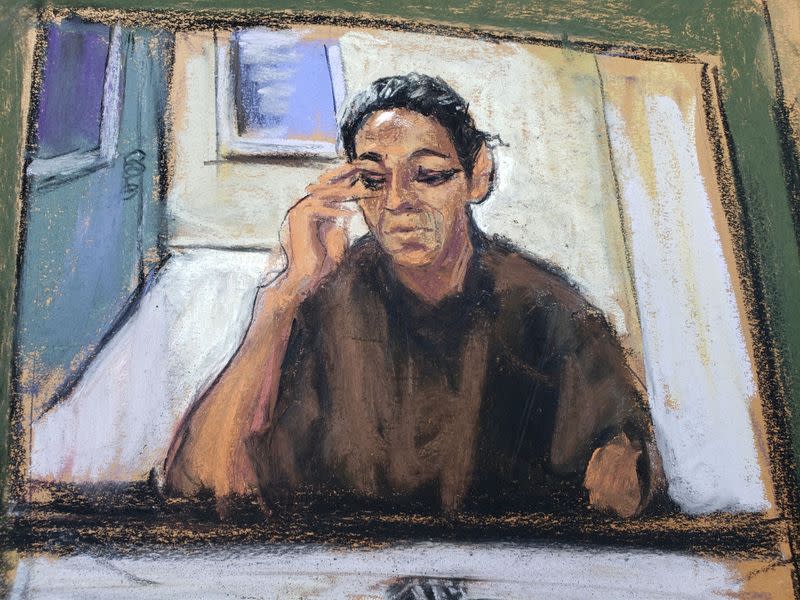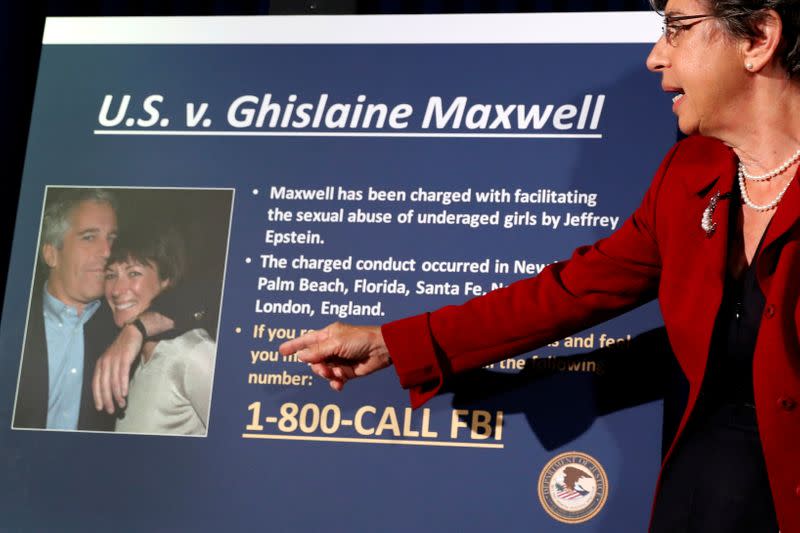Long legal battle by Jeffrey Epstein victims could sink Maxwell's defence
By Tom Hals and Karen Freifeld
(Reuters) - Women who say they were victims of Jeffrey Epstein have spent 12 years trying to undo an unusual plea deal that spared the deceased financier from federal prison. Now their efforts could sink a key legal defence for Ghislaine Maxwell, who was charged this month with luring girls so Epstein could abuse them.
The 2007 deal allowed Epstein to plead guilty in a Florida court to soliciting minors to engage in prostitution and serve just 13 months in county jail, which included work release.
The once-secret agreement included nonprosecution protection for unidentified co-conspirators such as Maxwell, a provision that U.S. attorneys since have acknowledged in court was unprecedented.
At Maxwell's bail hearing on Tuesday, her lawyer Mark Cohen said she cannot be prosecuted because of that agreement, a position that Manhattan federal prosecutors have described as "absurd" in court papers.
Maxwell was denied bail and ordered held until her trial in July 2021.
The government charged Maxwell with luring and grooming minors for sexual abuse by Epstein at his mansions in Florida, New York and New Mexico, as well as at Maxwell's London residence, in the 1990s. She is also charged with perjury from 2016 testimony in a civil case.
Maxwell's defence lawyers did not respond to requests for comment and prosecutors declined to comment.
The 2007 plea deal also came up last year when Epstein was charged with child sex crimes by Manhattan federal prosecutors, who said the Florida deal did not protect Epstein in New York. Before the issue could be resolved in court, Epstein was found hanged in a Manhattan jail while awaiting trial. His death was ruled a suicide.
Several alleged victims of Epstein have been challenging the plea deal since 2008 arguing it violated the Crime Victims Rights Act (CVRA) by concealing the Epstein plea and nonprosecution agreement until after it was signed.
Had the alleged victims been informed of the deal, which they argue was their right under the CVRA, they could have tried to prevent a judge from approving it.
The plaintiffs are seeking to invalidate the deal and the provision that protected co-conspirators, but after Epstein died a federal judge tossed their case.
That ruling was upheld by a three-judge panel on an appeals court in Atlanta this year, which ruled 2-1 that the CVRA had not been triggered because Epstein was never charged with a federal crime.
The alleged victims have asked the full Atlanta federal appeals court to revive their case and determine if the lower court wrongly refused to invalidate the plea deal, said Paul Cassell, who represents alleged Epstein victim Courtney Wild in the CVRA case.
"If the agreement is ripped up, she can't get to first base," said Cassell, who is also a law professor at the University of Utah, former federal prosecutor and former federal judge.
On Monday, prosecutors dismissed Maxwell's plea deal defence. In a court filing, they said her crimes were committed before and after the timeframe of the plea deal, Maxwell was not a named party to the deal and argued prosecutors in New York are not bound by their counterparts in Florida.
Retired Harvard Law Professor Alan Dershowitz, who helped defend Epstein in 2007, said Maxwell can counter each of those arguments. "When the United States government makes a promise, it’s binding all over the country," he said.
The alleged victims have garnered noteworthy support for their appeals case, including from U.S. Senator Dianne Feinstein, a Democrat, and former Republican senators Orrin Hatch and Jon Kyl, authors of the 2004 CVRA law.
The trio filed a brief urging the Atlanta federal appeals court to revisit the Epstein plea deal and CVRA case. "This miscarriage of justice," they said of the agreement, "is precisely what the act prevents."
(Reporting by Karen Freifeld in New York and Tom Hals in Wilmington, Delaware; Editing by Noeleen Walder and Tom Brown)

 Yahoo Finance
Yahoo Finance 

